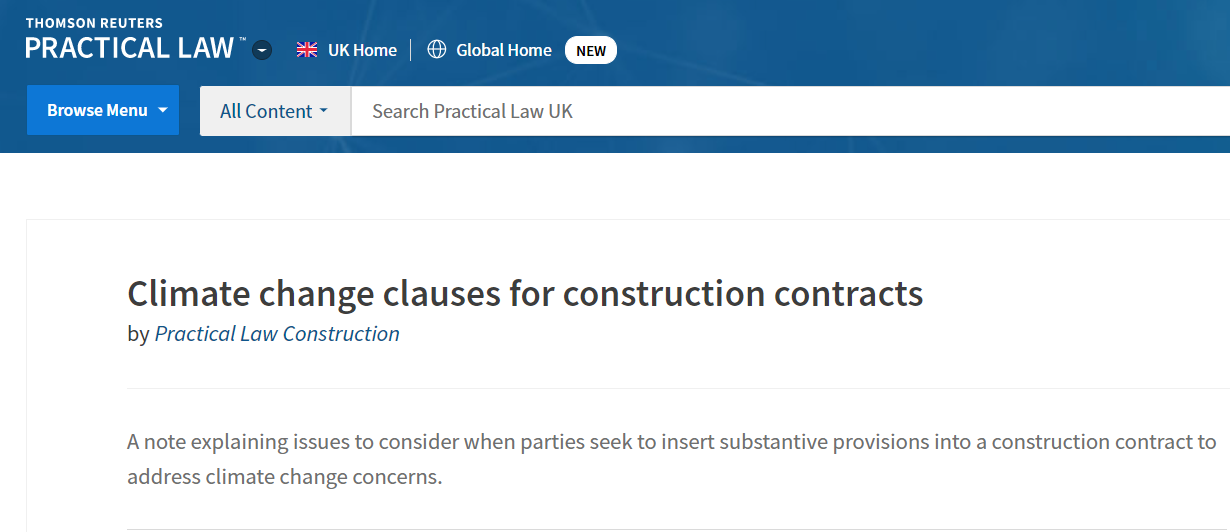Earth Day Insights: Using Construction Contracts to Address Climate Change

The surge of investment in construction – from new housing to infrastructure projects – may be an opportunity for legal professionals to help fight climate change.
Brandon Moss, senior legal editor, Litigation, Practical Law, described what’s behind the construction boom in the United States: “The pandemic exacerbated issues in the housing market, leading to the need for new construction to expand the domestic housing stock.”
He added that state and local government entities are also pursuing a variety of infrastructure projects, fueled by federal funds from the American Rescue Plan Act (ARPA) and the $1 trillion federal infrastructure bill that passed last year.
“Construction triggers a key opportunity to pursue and achieve net-zero goals, in terms of materials and construction methods,” Moss explained. He said Practical Law editors are integrating construction-related clauses from The Chancery Lane Project (TCLP) within Practical Law resources to ensure that subscribers can access the most comprehensive, accurate, and up-to-date information.
Thomson Reuters has long supported TCLP, a collaborative initiative of lawyers worldwide working to make climate sustainability a part of every commercial agreement and precedent to help fight climate change. The clauses developed by TCLP are freely available to law firms, corporations, and governments worldwide.
Yassir Mahmood, senior editor, Practical Law, Construction co-hosts the monthly Practical Law Construction Briefing podcast and serves on TCLP’s Built Environment Advisory Committee. He shared how TCLP construction-related clauses in Practical Law resources are being used.
“Practical Law subscribers say there is a demand from clients to address climate change in contract clauses, and they are on the lookout for suitable wording,” Mahmood said. “That is because many clients and their funders have Environmental, Social, and Governance (ESG) policies that require climate action; indeed, many are subject to ESG reporting obligations by law.”
Mahmood noted an important recent construction law development in England and Wales: “The vast majority of commercial construction projects use one of the well-known industry standard forms of contract – most often the Joint Contracts Tribunal or New Engineering Contract forms. The NEC published some extremely promising draft wording earlier this month, which is a huge step forward.”
Progress is also being made on resources for tackling climate concerns through construction contracts in the United States.
“The U.S. Government Practice team published Contract Clauses for Government: Construction Waste Management in late 2021,” said Roger Horner, senior legal editor, Government Practice, Practical Law. “We have two more in the drafting stages. One of the clauses we’re working on now deals with incorporating net-zero objectives into a construction contract for a public project. The other deals with incentivizing a contractor to propose net-zero modifications to a construction contract. Both of them encourage government entities to seek out contractors that buy into the government’s environmental goals.”
“The construction industry recognizes the need for change,” added Mahmood. “However, there are so many huge pressures on the industry that the task of integrating climate-change obligations requires a deep understanding of the impact they may have on parties that are operating on fine profit margins, in a litigious environment and a tightening insurance market.”
This Practical Law Practice Note identifies and critiques the climate-change clauses for construction contracts in the UK, which Mahmood said legal professionals can turn to whenever their clients are ready to address climate change.
“These clauses will be there whenever one of our subscribers is tasked with drafting contract provisions to make public construction projects greener,” Horner said. “I’m a former municipal attorney, and I always liked knowing that if I did my job right, I could contribute to making my community better. I like to think that when legal professionals use these construction clauses, we’re helping them assure a better future for their communities.”

For more construction law insights, subscribe to the Practical Law Construction Briefing podcast.
Also, register for TCLP’s Negotiating Built Environment Climate Clauses workshop on April 26. TCLP recently began a Built Environment project to support the sector’s transition to net zero. The workshop focuses on how to tailor Built Environment clauses to clients’ individual requirements and build a plan of action for getting the clauses into contracts. Download TCLP’s construction clauses using the Climate Clause Selector, which provides 50 climate solutions across practice areas and sectors.
Finally, subscribe to TCLP’s new podcast series Contracts for the Climate, which focuses on the built environment and how lawyers can get climate-friendly clauses into contracts. Explore how lawyers in the real estate and construction industries can effect change by using tools to contract for the climate.